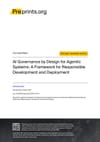⚡ Quick Summary
This concept paper introduces AI Governance by Design (AIGD), a proactive framework embedding ethical, legal, and societal values throughout the development of agentic AI systems. It contrasts AIGD with reactive approaches, outlines lifecycle-wide governance measures, and provides domain-specific case studies. Aimed at supporting trustworthy autonomy, it includes a blueprint for integrating governance into planning, development, deployment, and decommissioning.
🧩 What’s Covered
The paper delivers a design-centric governance model for agentic AI systems—those capable of independent decision-making and adaptation.
Key Concepts Introduced
- AI Governance by Design (AIGD): A proactive model that embeds fairness, accountability, explainability, privacy, and safety into each stage of development
- Agentic Systems: Defined as systems with autonomy, goal-directed behavior, and the ability to interact with and adapt to their environment
Lifecycle Framework
The author breaks down governance practices into six development stages:
- Planning & Design: Cross-functional involvement, risk anticipation, early boundary setting
- Data Preparation: Data quality, provenance, representativeness, and bias checks
- Model Development: Algorithm selection, fairness constraints, and transparency scaffolds
- Testing & Validation: Red-teaming, performance auditing, adversarial evaluation
- Deployment & Monitoring: Drift detection, logging, real-time oversight
- Retirement: Ethical shutdown protocols, data handling, and documentation
Governance Considerations for Agentic AI
The paper offers a 10-point checklist addressing:
- Transparency and explainability
- Human control vs. autonomy trade-offs
- Emergent behaviors and unintended consequences
- International standardization needs
- Inclusion and stakeholder participation
Three In-Depth Case Studies
Each illustrates governance mechanisms applied across lifecycle phases:
- Autonomous Financial Trading Agent: Stress tests, circuit breakers, volatility-based constraints
- Enterprise AI Assistant: Zero-trust architecture, NLP misuse filters, progressive access grants
- Clinical Decision Support Agent: Advisor-mode oversight, dual validation for high-risk recommendations, demographic-specific bias detection
Evaluation Metrics
- Compliance (e.g. audit trails)
- Ethical performance (e.g. fairness scores)
- Transparency (e.g. interpretability metrics)
- Trust (e.g. stakeholder surveys)
- Operational efficiency and data quality
💡 Why it matters?
This is one of the most detailed attempts to operationalize responsible AI specifically for agentic systems—a growing class of AI with increased autonomy and societal impact. By integrating oversight mechanisms directly into the architecture and lifecycle of AI projects, AIGD helps teams preempt regulatory, reputational, and ethical failures that are often identified too late.
❓ What’s Missing
- The framework remains conceptual; no downloadable tools or implementation templates
- Needs clearer alignment with upcoming global standards like the EU AI Act or OECD classification
- No economic or organizational cost modeling to justify investment in AIGD
- Case studies are illustrative but hypothetical—no empirical data or piloting results
👥 Best For
- Governance teams tackling autonomous or adaptive systems
- AI architects designing agent-based tools across finance, health, or enterprise IT
- Legal and compliance teams seeking integration strategies for multi-stage governance
- Public sector or standardization bodies crafting AI assurance protocols
- Research centers developing AI control and oversight methodologies
📄 Source Details
- Title: AI Governance by Design for Agentic Systems: A Framework for Responsible Development and Deployment
- Author: Himanshu Joshi (Vector Institute for AI)
- Platform: Preprints.org (non-peer-reviewed)
- Posted: 21 April 2025
- DOI: 10.20944/preprints202504.1707.v1
- License: Creative Commons CC BY 4.0
📝 Thanks to Himanshu Joshi and collaborators for this well-structured contribution to the AI governance conversation—especially timely as agentic systems move from lab to real-world deployment.


